
Architects know the end is near—might as well have a laugh
LAS VEGAS IS A CESSPOOL CALLED PARADISE. A desert city that anchors a valley in the Mojave Desert, it is melted Americana, a graveyard of neon lights and affluence, the final days of Elvis — given the cute moniker of Sin City to gloss over the stench of decades-old cigarette ash. Flip-flop-toting patrons wander aimlessly in casinos with ceilings painted to look like the night sky, without ever once leaving to breathe fresh air. It’s also deceptively and depravedly… fun? There is no place that feels less fitting than here to meet Architects bandleader Sam Carter, a vegan and environmental activist with a knack for performing apocalyptic lyrics that now read like Nostradamus prophecies, to discuss his band’s 10th studio album the classic symptoms of a broken spirit. Except, of course, that we’ve both been invited to this town, he’s a rock star, and this is where rock stars tend to go. “I’ve got nothing else [going] on!” he laughs. “It’s a good time.”
We’re here for the inaugural G2: An Active Rock Gathering conference, a three-day event in late September that brought together some of the most influential figures in American mainstream rock music — one that kicked off with a moving keynote speech by Papa Roach’s frontman Jacoby Shaddix, requesting the room of industry professionals be more open-minded in their approach to the four-letter genre. The next day, in a bowling alley, Carter hosted a listening party for the aforementioned record (his band were unable to join him for visa issues, and tour issues, and all the other issues a post-lockdown pandemic reality has caused for international musicians hoping to enter the United States). “It’s an awful lot of money to swallow,” he says of canceling their 2022 U.S. tour. “There’s no insurance. It’s our lives, our business, and we had to make the difficult decision not to do it.”
Read more: L.S. Dunes were a lifeline during the pandemic for five best friends, no ego included
It’s also a huge risk for a band just on the cusp of breaking big in America. Their last album, 2021’s For Those That Wish to Exist, skyrocketed to No. 1 in the U.K. and Australia, and produced “Animals,” their biggest single to date — a chugging, electro-metal explosion that became inescapable on rock radio stateside. In the before times, not being able to tour on a track like that is self-slaughter. For Architects, it meant getting creative.
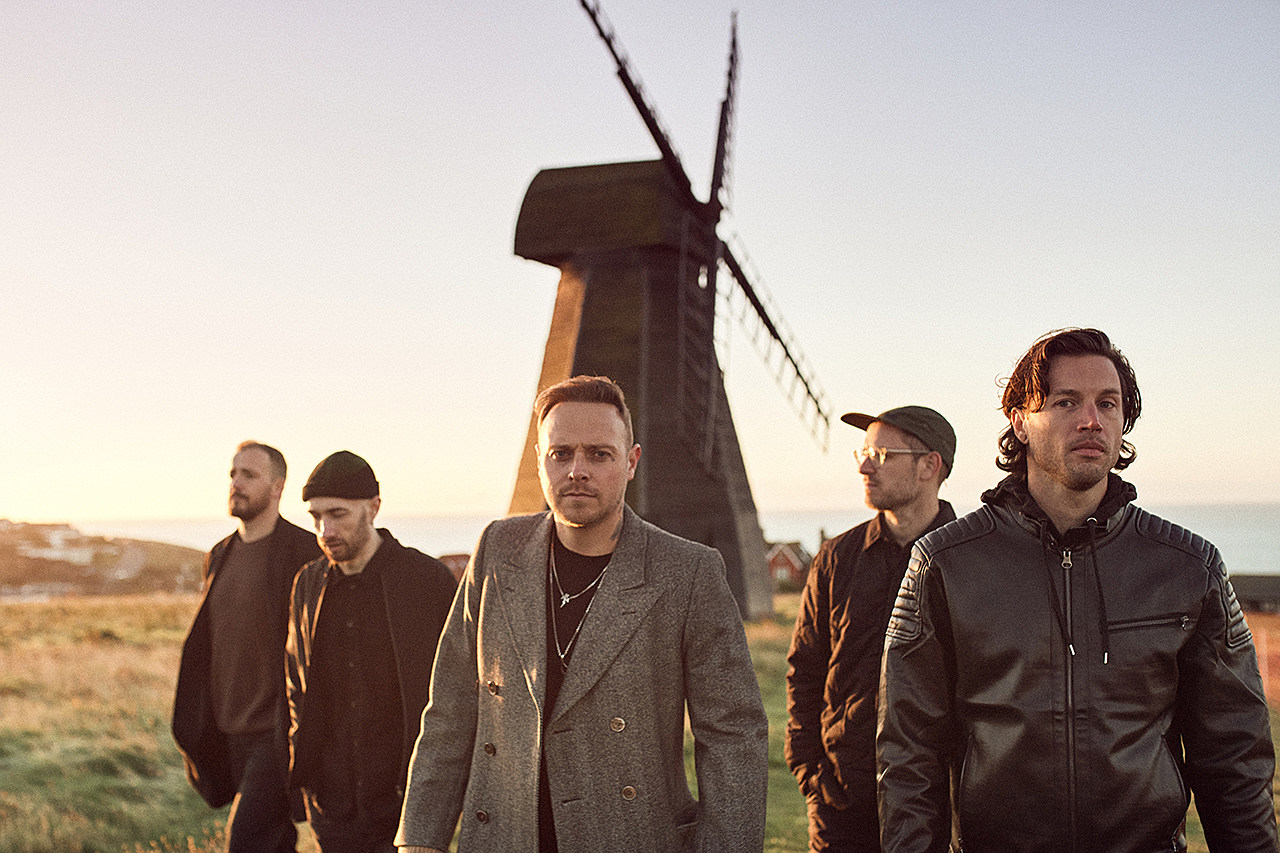
[Photo by Edward Mason]
TWO WEEKS AFTER VEGAS, Carter and AP connect over Zoom — he’s in a neutral plaid jumper (cardigan for the rest of us) and a worn graphic T-shirt with the cover of the seminal Beatles album Let It Be on his chest — seated outside a bedroom closet, and next to a healthy pathos plant that gingerly grazes his shoulder. It’s a disarming look for a man metalcore purists just don’t seem to want to leave alone, a man who can command a room of thousands with songs about nihilism and the end of days.
“I’m just opening a box,” he says, half-apologetically, cardboard in hand. “I think it might be our records. I want to see them.” He pauses, and looks directly at his computer’s camera. “Look at the pure excitement on my face! It’s pouring out of me.” (For the avoidance of doubt, it should be noted that much of Carter’s humor is delivered through a heavy tone of British sarcasm. This band are very English, after all.)
Every interview should start with an unboxing — he is beaming at the classic symptoms of a broken spirit’s austere design (“It was inspired by a conversation I read; with the Beatles manager Brian Epstein,” he starts. “He was talking about Sgt. Pepper’s, and Paul [McCartney] was really stoned, telling him about what they were going to do for the artwork, and he was like, ‘Why are you doing that? If the record is so good, you could sell it in a brown paper bag.’ So, I was like, ‘Fuck it, let’s go minimal.’” The thing about Beatles fans is that they will not stop talking about the Beatles, and they are always right to.) Carter opens the gatefold — there’s an image of a figure walking on a tightrope. “You can’t tell which angle it’s from,” he says. Are you above them, staring down in admiration? Or below, preparing for the fall? It was unintentional, he assures, but it doubles as a perfect distillation of Architects’ ethos: 18 years into their career, and they’re still obsessed with contradictions, optimism and pessimism in equal parts, empathy and total fucking despondency.
Here’s an example: When asked if Carter was disappointed that his band’s latest record didn’t go No. 1 again, like with the last record, he laughs. “Taylor Swift [took] that pressure off of us. She released the same day. Arctic Monkeys, too,” he says. Those traditional markers of success “only mean anything if you’re stuck in an awkward conversation at a family barbecue or wedding, or in a cab… You can’t talk about it in normal life. You walk around looking like a prick.”
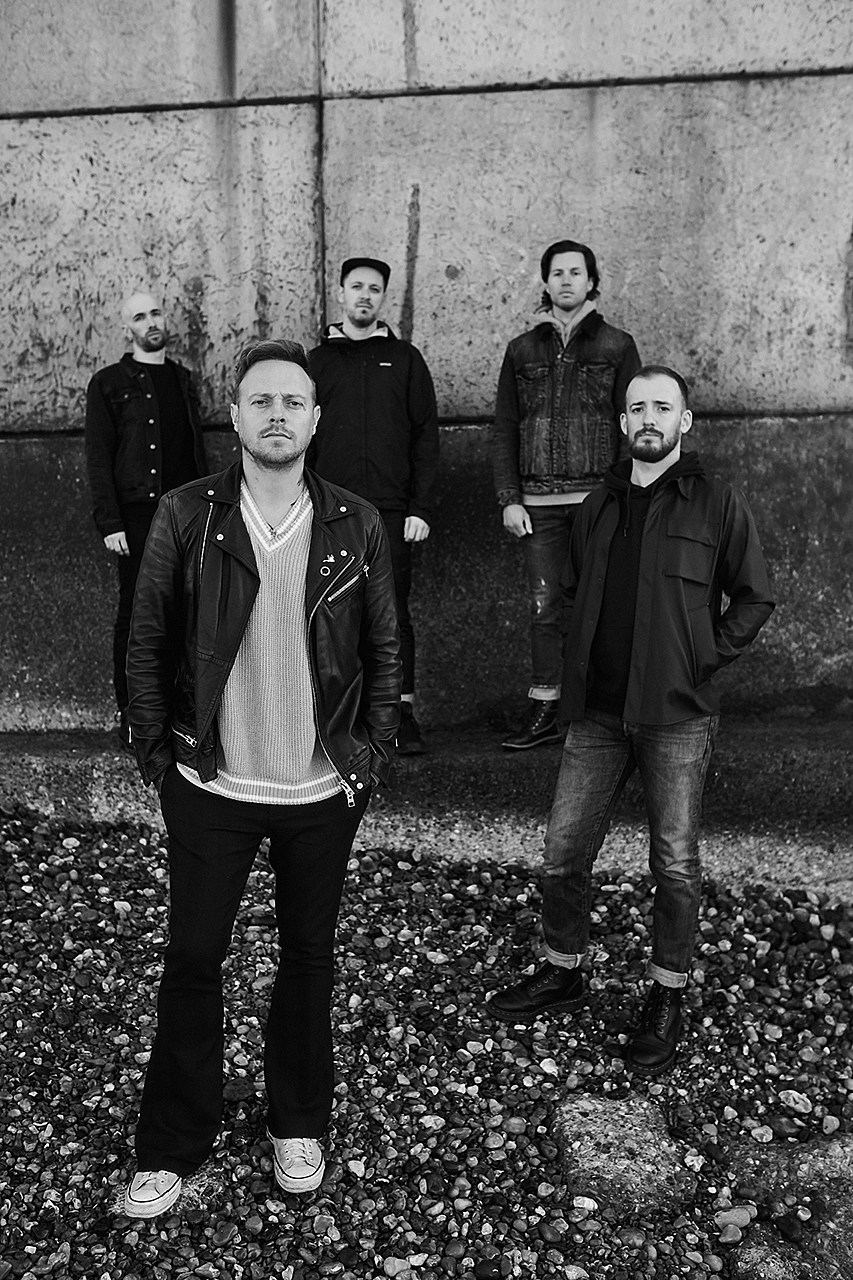
[Photo by Edward Mason]
ARCHITECTS FORMED IN 2004 around Brighton, East Sussex, in the U.K. by drummer Dan Searle and his twin brother, the late guitarist and lead songwriter Tom Searle, later joined by Alex “Ali” Dean, singer Sam Carter (following a brief stint by Matt Johnson, the vocalist on their debut LP, 2006’s Nightmares), and guitarists Adam Christianson and Josh Middleton in 2015 and 2016/2017, respectively. Like many talented bands with tireless work ethic, they released a new album once every two years or so, evolving their sound in the process. For them, it ranged from metalcore and post-hardcore to something involving strings, and lately, industrial, mechanical soundscapes and unavoidable melodicism, impressing their listenership with each meticulous evolution. Well, most of their listenership. Not ���the gatekeepers,” Carter explains, referring to the small faction of Architects listeners who demand they “play the old stuff.”
“They love to tell you what your band should sound like, which one of your records is the best, which one you should sound like.” It should be said that if you want their older music, it’s still readily available. “We’ll reprint it for you, if you want. A sparkling new variant,” he jokes. “In gatekeeper [speak], mum’s basement red.”
The most pivotal shift in the band’s career came in 2016, when its principal member, Tom Searle, passed away after a three-year battle with cancer. With the wisdom that comes with distance, the tracks on the record they released that year, All Our Gods Have Abandoned Us, are clearly written from the perspective of a man aware of his own mortality — that he was going to die — positioning the albums that followed, 2018’s Holy Hell and 2021’s For Those That Wish to Exist as meditations on grief and apocalyptic reality in equal measure, from his brother’s pen. (“We’ve been talking about this [current] Orwellian state for a few records,” Carter admits.)
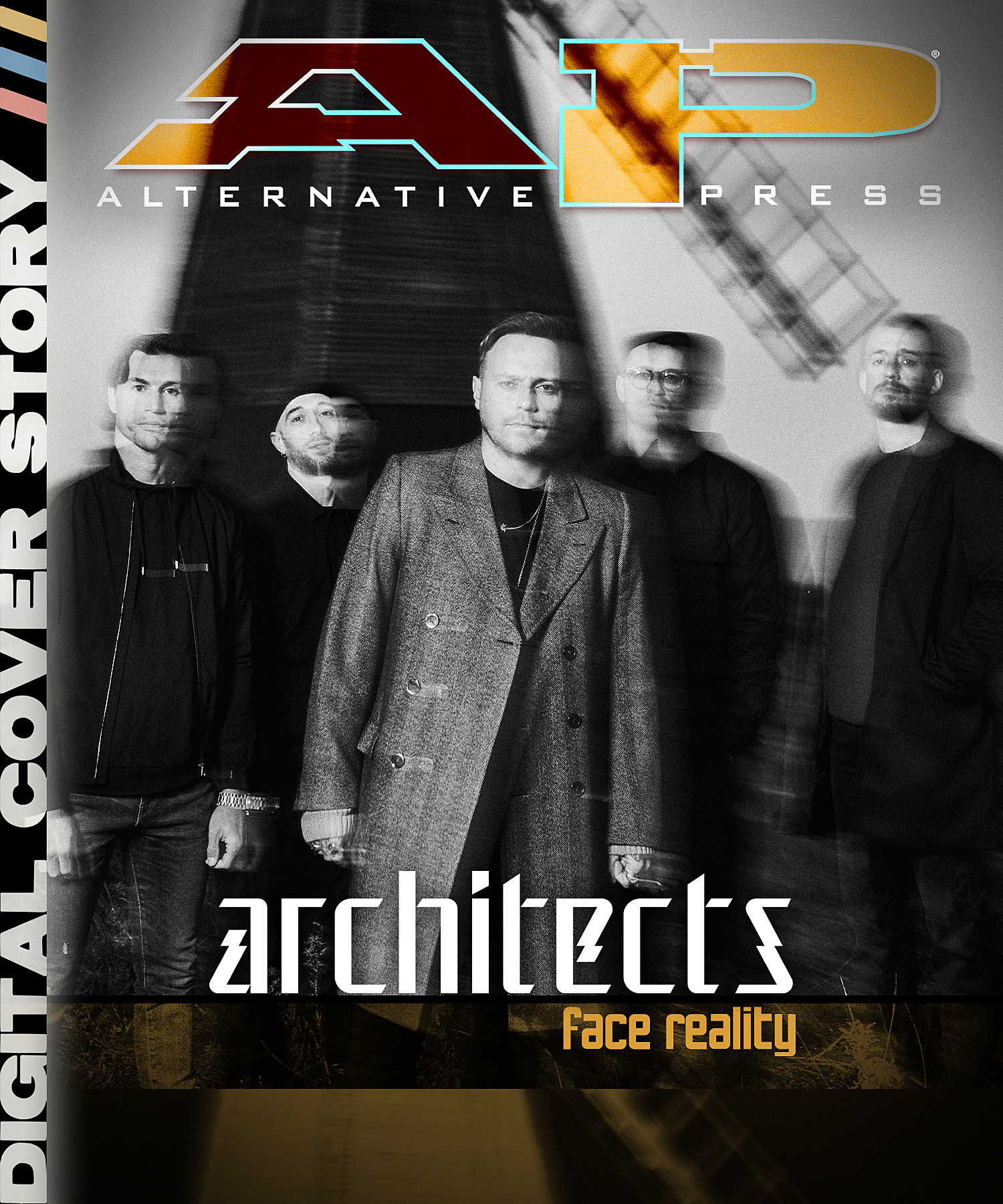
[Photo by Edward Mason]
Not once, however, did the band consider throwing in the towel. “We went to Australia two weeks after the funeral, which, in hindsight, I don’t think I would change. It was important to be together, to be active, to keep moving forward,” Carter says. Onstage, Carter began giving speeches to honor Tom, changing the language every night. “I wasn’t there waiting for someone to be like, ‘You’re so brave.’ I just wanted to be like, ‘This is the fucking truth.’ We’re all going to be affected by [death] at some point in our lives. We’ve just had it a lot earlier. And it’s fucking awful.” He pauses. “Vulnerability is super key in this world. Everything’s so black and white, especially online. Everything’s dehumanized… We’re only trying to be honest.”
That, in turn, inspires incredible candor from Architects fans who approach Carter to express gratitude, and tell him about their own personal losses. “You have these conversations, and you’ve helped people through certain situations, but you have to remind them that you haven’t. They’ve done it themselves. We were just the soundtrack,” he says. They’ve chosen to unburden themselves; his band have simply provided the riffs. “I always tell people, the hardest thing you could ever do in life, if you’re struggling, is make that phone call to a therapist or family member or friend. It’s the fucking biggest day of your life.”
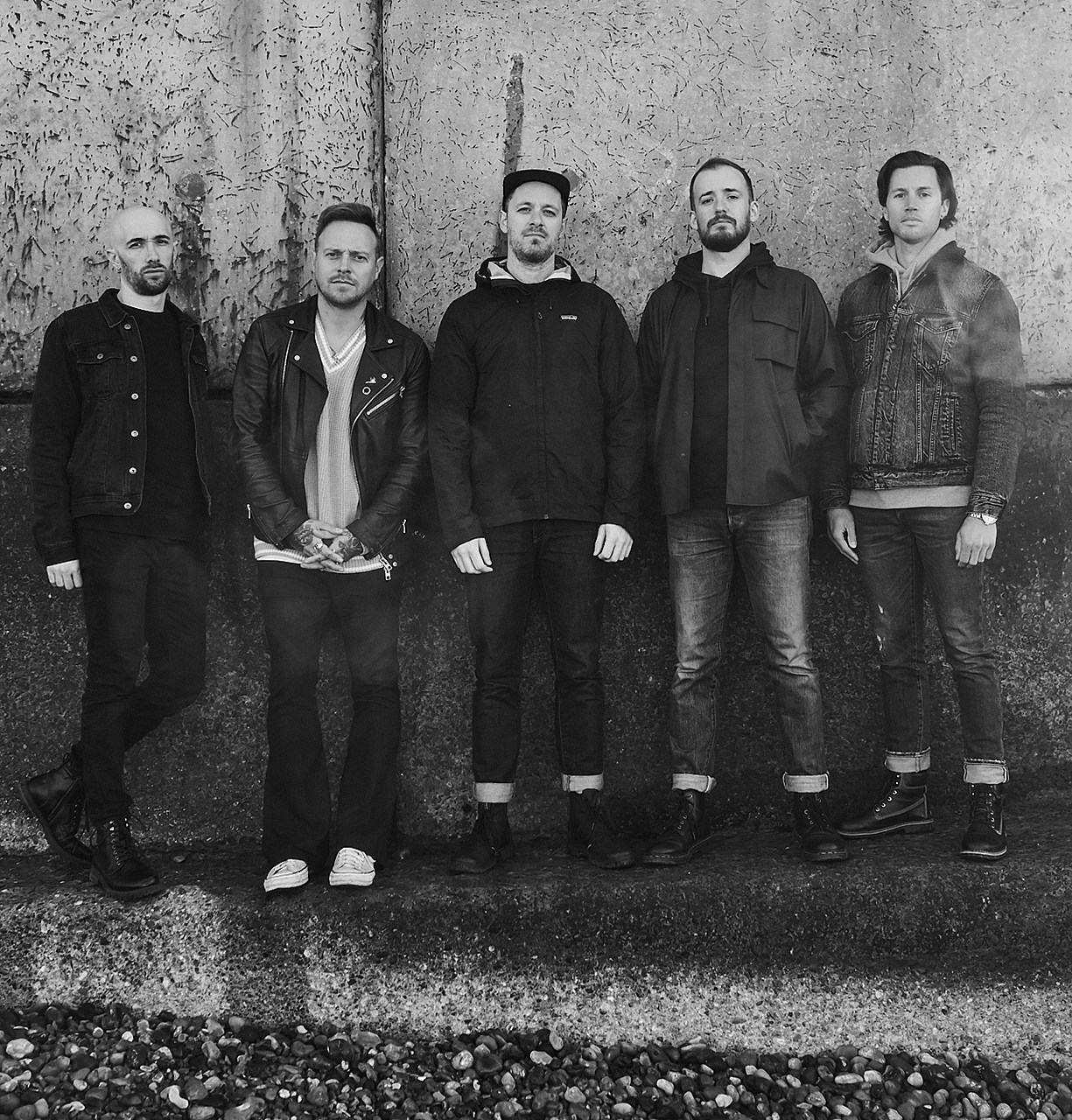
[Photo by Edward Mason]
HUMOR ISN’T AN EMOTION that one might initially associate with Architects’ 10th studio album — it happens to be the most industrial-sounding — but the writing and recording process was centered around play, and the joy of experimentation. “Drinking too much coffee, focusing on subs and synths, plugging different fucking wires in the back of things,” as Carter describes it. New inspiration, from the electro sounds of “Animals,” but also the band’s undeniable appreciation for groups like Nine Inch Nails and Germany’s greatest pop cultural export, Rammstein, inspired a new detour into synthwave (less Bring Me the Horizon and more “German sex club,” Carter jokes.) They recorded with found objects — keen ears might identify the sound of a dishwasher door being slammed on “all the love in the world,” or a bag of coins being dropped on the floor, or the sound of a fire extinguisher being struck. They stomped on floorboards. Carter, a drummer himself, set up a station to amplify Searle’s percussion with two floor toms, maracas, shakers, tambourines, a detuned snare drums… an approach that could’ve produced a truly gnarly no-wave noise record, if it wasn’t employed by a band with a knack for melodic metal.
He glances back over at the box full of his new record, the classic symptoms of a broken spirit, recorded in Devon. “We’re our own worst critics, really,” he volunteers. “I know what makes a good Architects song, and that’s why I don’t sleep for years when we’re writing them… So we’ll just keep writing these cheery records.” He laughs. “We have to laugh a bit; it has to be a bit tongue in cheek. It’s built into our characters, as English people.”
But the fun stops there. Sort of. “It’s the least optimistic Architects record,” Carter explains, a continuation in the group’s exploration of the end of the days. (This band could be totally soul-crushing, but that would discount Carter’s activism, like his involvement with the #GoLocal initiative this past Earth Day, or his work with the Sea Shepherd Conservation Society.) And that the record is “like a British person saying, ‘We’re fucked, have a nice day,’” as Carter explains. “But there is playfulness in the delivery; in the vocals, you can hear more character, more emotion. We’re not sat around, like, ‘We’ve got about 50 years left. I guess we shouldn’t record this record. We should probably go home and cry, and say goodbye to our loved ones.’ Fuck, let’s go have a laugh.”

[Photo by Edward Mason]
the classic symptoms of a broken spirit is new territory for the band, built from the pieces of their past — refined metalcore, if you must use the term — not too similar to 2014’s Lost Forever // Lost Together, 2016’s All Our Gods Have Abandoned Us and 2018’s Holy Hell, but not a complete departure: a progression not only because Middleton and Searle have taken on songwriting duties originally held by Tom. “We don’t have to be held down by these rules of metal,” Carter says of the progression. “If you think it’s a good record, it’s a good record. You just have to remember you think it’s a good record.”
There’s that, and the fact that Carter is, you know, singing — there’s no guttural, animalistic need to scream over the slow-as-hell breakdown on “deep fake,” for instance. “If you have 11 songs with 11 breakdowns, after a while you’re gonna be like…” He stops his thought to examine a pretend watch on his wrist. “‘The breakdown should be here any minute…’ But when you’ve done 10 records, you have to try some new stuff.” And for that scream that is in “deep fake”? “We recorded that on an iPhone in the middle of the room, and it sounds fucking furious because there’s no compression. It sounds distant and fucking horrible,” he says. “With so many breakdowns, aggressive vocals getting more and more aggressive, then shout, shout, shout, we’ve built a fucking entire career off of it. There’s a fucking time and place for that. I love it. It’s on [our other] records. But we’re trying to do new things.”
Unfortunately, a conversation surrounding “deep fake” cannot end there: In the music video for the song, the band perform in front of hellish LED screens, computerized visuals failing, broken up by close-up shots of the band. When the camera zooms in on Carter, he’s rocking a liberal amount of mascara, an absolutely glam, black smoky eye on par with some of his metal heroes. It’s completely innocuous, a musician expressing himself through makeup like musicians have done for decades, and yet, it inspired total and complete vitriol. Carter became the target of homophobic hate speech online, quickly coming to the realization that the heavy music scene isn’t as progressive or kind as he’d assume it to be.
“I wanted to do it. I’d been a bit nervous because I didn’t want to be attacked for it. I got to a point where I was like, ‘This is an inclusive scene. We look out for each other. We stand up for what we think is right.’ Turns out, it’s not,” he looks down. “It said to me that there’s a lot of people that are very uncomfortable with what they do in their lives. I don’t know whether they wish they could do it so they’re angry that they can’t, or whether they’re annoyed that I’m doing it, or whether they saw me as a sort of ‘bloke’s bloke’ where I’m a big tough guy. It’s not me. That’s not how the world should view men.” Next time, he says, he’s going to go even bigger. Where’s that language when Ozzy does it, or Mayhem?
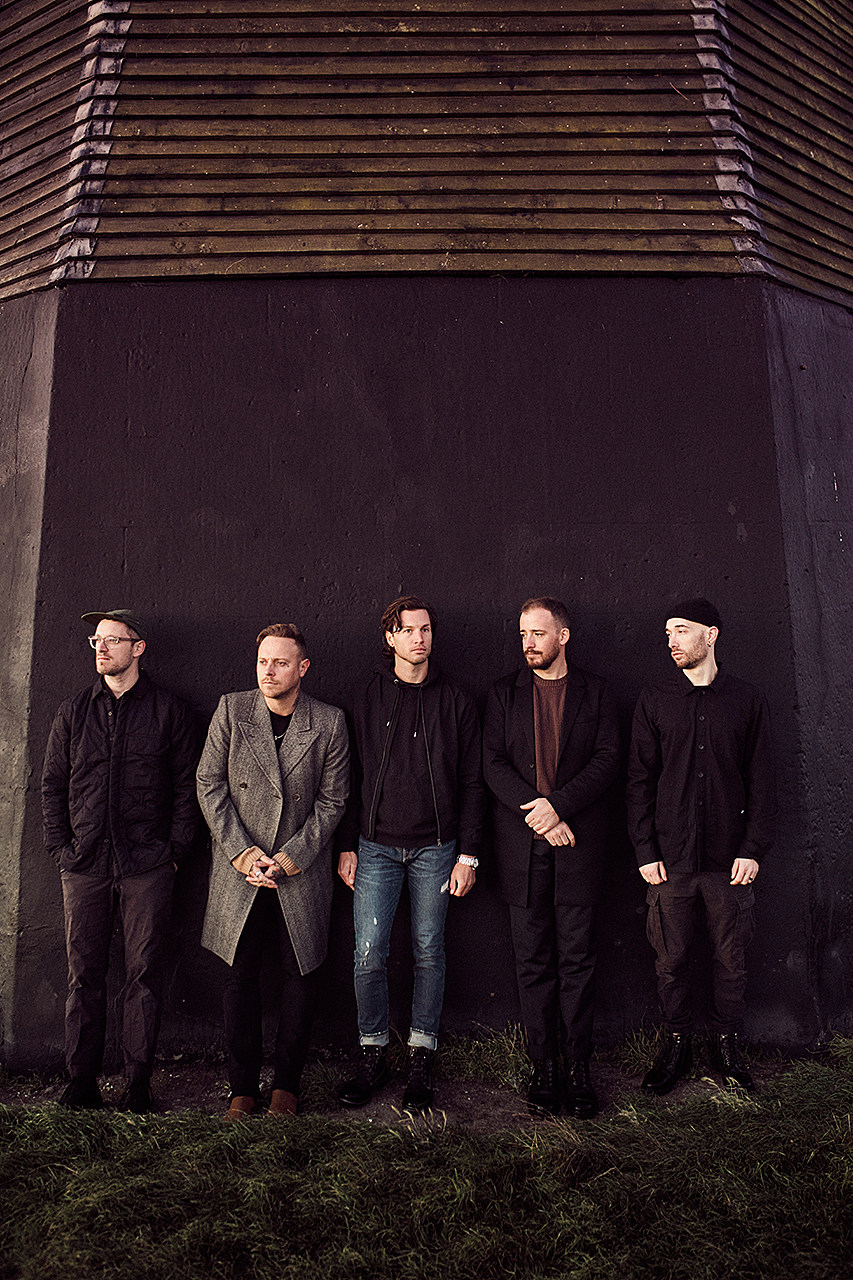
[Photo by Edward Mason]
“You just want to turn to those people and go, ‘Fuck me, go to therapy. Please, god, spend some time in therapy,’” he rolls his eyes. “It would make the world a better place.”
At this point, Carter’s publicist interrupts the conversation, informing him that he has another interview. He decides to miss the first 10 minutes of it for AP. “I’m sorry I’m late!” He practices his apology. “I was talking about my mascara.”
As men should. Much of Architects’ music, by virtue of being both made by men and introspective and meditative on the destruction of the planet as made by man, means a conversation of masculinity is unavoidable. That is especially true when it comes to enduring taboos, like mental health. Carter has been forthright about his use of antidepressants in the past, as an example (“If I hadn’t been on them at the time that I was on them, I wouldn’t be here,” he reveals), and working to destigmatize mental health issues is most crucial to his gender: Men make up 49% of the population but account for nearly 80% of all suicides. If he, as the frontman of a band that faced such a traumatic and public grief, has become something of a face for loss and depression, the world is lucky that he’s up for the challenge.
“There’s a story I’ll never forget, that my friend Jesse [Barnett] from Stick to Your Guns told me about a guy that jumped off the Golden Gate Bridge,” he starts. “He wrote a note. ‘If somebody smiles at me today, I won’t jump.’ He jumped. You never know what that little smile or ‘How are you?’ can do. It’s important to start this conversation rather than it being a clickbait ‘It’s OK not to be OK’ thing. No! Have those hard conversations with your friends, if you’re concerned. Really have that chat.” It’s not a radical idea, by any means, or a particularly innovative one — but one that cannot afford to go unrepeated. And there lies the optimism — even in the face of total melancholia, people create encouragement by passing it along to each other.
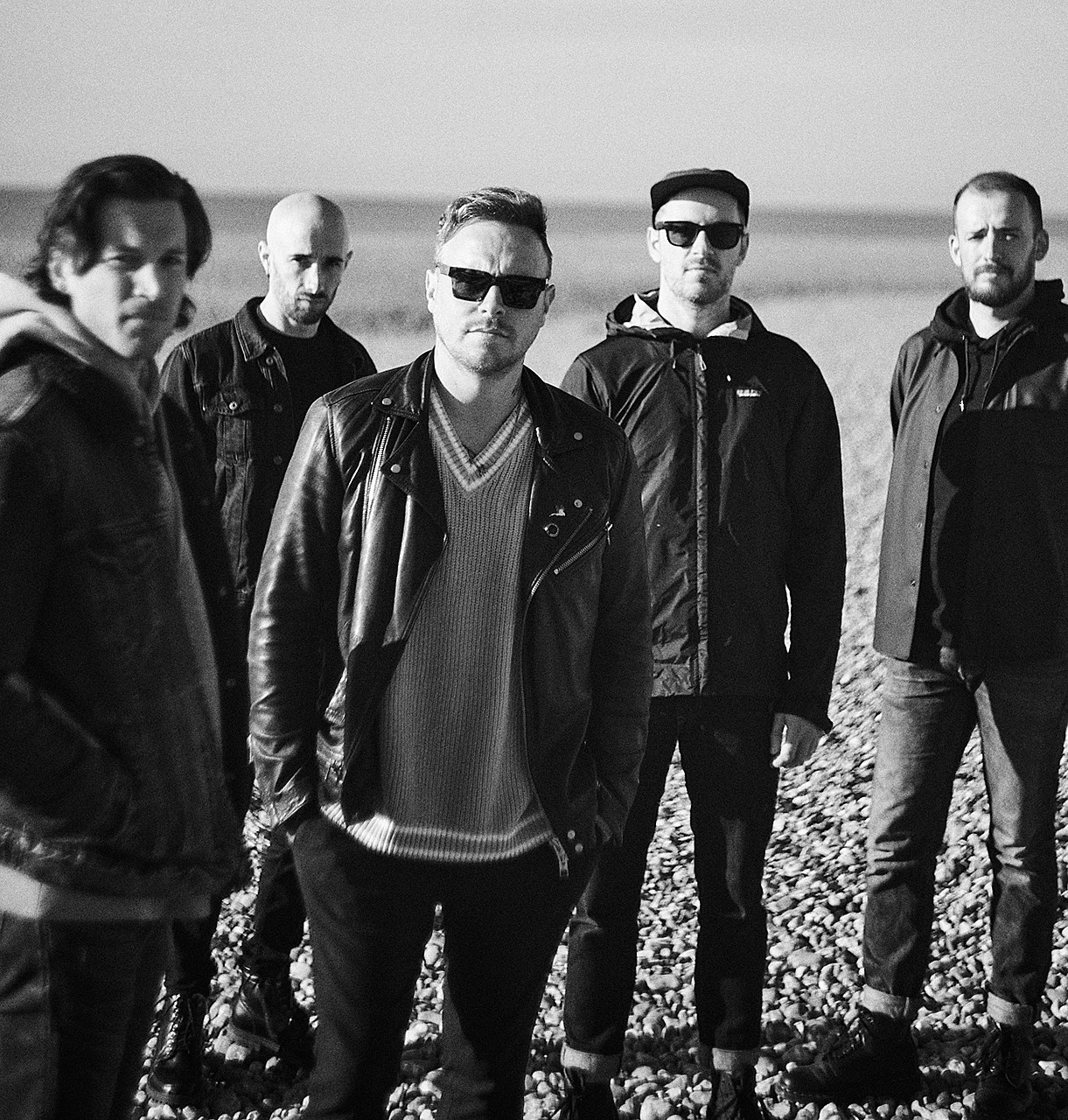
[Photo by Edward Mason]
THE CLASSIC SYMPTOMS OF A BROKEN SPIRIT ENDS with the sounds of birds. Not a single bird song, but the Dawn Chorus — a moment at the start of spring in the U.K. when the birds start to sing at the beginning of each new day. (It exists elsewhere, but for Architects, it’s a distinctly English phenomenon. And an ecological sign of prosperity: In a time where species are quickly being eradicated from our planet due to the ongoing climate crisis, there’s some momentarily solace to be found in the birds that continue to come back, and sing, year after year.) When the band were recording the album in Devon, they heard these birds each day. “It was just so peaceful. When it came to the end [of the record], it just made perfect sense,” Carter says. “It’s the moment where you take your headphones out and exhale, being back in nature and removing yourself from the industrialized world we live in,” and, of course, the one his band created on record.
It’s also the perfect sonic metaphor for all that Carter and co. have been trying to accomplish: stare directly into evil to defeat it, appreciate the good, face your pain, work out your joy, do not fear complication, only apathy. In that way, the classic symptoms of a broken spirit is, well, hopeful. Only Carter would say it with a wink.










